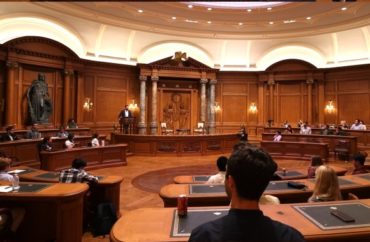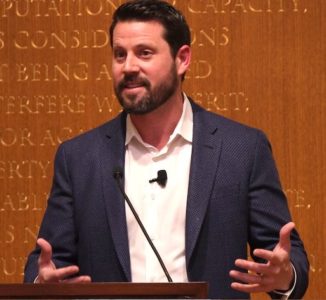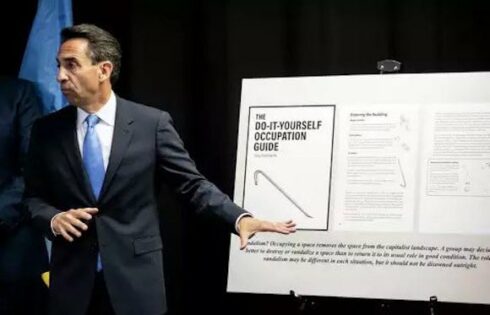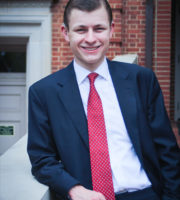
‘The truth is that you simply cannot talk about life, meaning, goodness and God with people and leave feeling half-hearted about them,’ student attendee said
DALLAS — Professors and inquiring young minds gathered in the last two weeks of June for a program sponsored by the new University of Austin, designed to encourage questions that might get a scholar canceled anywhere else.
“Do Christianity and science flourish together … or are they fundamentally at odds?” Professor Dorian Abbott asked students in his seminar, one of eight in the second annual “Forbidden Courses” summer program.
“Raise your hand if you’re not vaccinated,” one student said.
One hundred and eight young people, primarily college students, gathered from across the country for a program encompassing non-credit seminars, lectures and group activities. The program’s mission was to connect young people with “courageous academics and leaders to explore the great questions of our time.”
Over each one-week session, there were no trigger warnings, microaggressions or safe spaces. Conversation was bound only by the university’s statement of principles: “freedom of inquiry, freedom of conscience, and civil discourse.”
Additional questions discussed included: “Should people below a certain intelligence be allowed to reproduce?” “Are there human races?” “Is sex binary?” “What is ‘queer’?” “Are institutions really that woke?” “Does the end justify the means?”
Courses over both sessions included “The Psychology of Morality,” taught by writer Rob Henderson, “The Invasion of Biology Into Evolutionary Biology” with Luana Maroja, chair of the biochemistry and molecular biology program at Williams College, and “Racial Inequality in America,” taught by economics Professor Glenn Loury of Brown University.
On June 29, when the Supreme Court overturned affirmative action in higher education, Loury led his students in discussing the decision.
 The setting was a 12.5 acre campus called Old Parkland, furnished with wood-inlaid conference rooms, a debate room styled after the Roman Senate chamber, and portraits and statues of classical and libertarian figures and American conservatives and founding fathers.
The setting was a 12.5 acre campus called Old Parkland, furnished with wood-inlaid conference rooms, a debate room styled after the Roman Senate chamber, and portraits and statues of classical and libertarian figures and American conservatives and founding fathers.
After their classes, students heard from speakers such as former New York Times writer and founder of The Free Press Bari Weiss on the current media environment; Babylon Bee owner Seth Dillon on how satire can tell the truth; and Michael Shellenberger, a writer and former California gubernatorial candidate, on overcoming victimization and “escaping the Woke Matrix.”
"Overcome your victimization. That's the heroic journey." —@shellenberger https://t.co/NguP7TrieG pic.twitter.com/ChJMBMdYS2
— University of Austin (@uaustinorg) July 5, 2023
Participants reflected on their experience with enthusiasm.
“I was at the Forbidden Courses for a week,” wrote Greta VanDamme, a recent graduate of Thomas Aquinas College in California. “It felt like a lifetime.”
“I think that’s because we did so much living. Every conversation was a full spiritual meal.”
“After knowing them for five days, I love the people I met at the program,” VanDamme continued. “…The truth is that you simply cannot talk about life, meaning, goodness, and God with people and leave feeling half-hearted about them.”
“Forbidden Courses proved to me that we are free,” wrote Adam Deng, a rising senior at MIT, in a thank-you note to the program shared with The College Fix.
Even more, “we are commissioned by God to flood the the world with light,” he wrote. “To this end I am proud to align myself with the University of Austin.”
In 2021, the founders of the upstart University of Austin “promised an education without the censorship and enforced ideology present at most traditional universities,” The Fix reported at the time.
Campus leader Jacob Howland, in an essay in the winter 2023 edition of City Journal, wrote that he believes the university will succeed because of its demonstrated record of success in its Forbidden Courses program. At the the time of his writing, the university also had more than 5,000 inquiries from potential faculty and 1,500 individual donors, “more than 60 of whom made gifts of six, seven, or eight figures.’”
“We plan on having the leanest possible administration that is necessary to function as an institution,” University President Pano Kanelos told The Fix in December. He noted that some elite institutions have as many administrators as students.
“A university is a community of students and faculty that should be supported at the fringes by these people we call ‘administrators,’” he said.
The university hosted its inaugural two-week “Forbidden Courses” summer program in Dallas in June 2021.
Admissions to the university are not yet open, but it plans to welcome its first class of approximately 100 undergraduate students in fall 2024, Kanelos told The Fix. Within five years, he said he expects a total undergraduate student body of approximately 1,000 students.
— College Fix assistant editor Maggie Kelly contributed reporting. Kelly attended the first week-long “Forbidden Courses” summer session and writer Declan Hurley attended the second.
MORE: ‘Wokeness has replaced gratitude’: conservative scholar
PHOTOS: University of Austin
Like The College Fix on Facebook / Follow us on Twitter






Please join the conversation about our stories on Facebook, Twitter, Instagram, Reddit, MeWe, Rumble, Gab, Minds and Gettr.